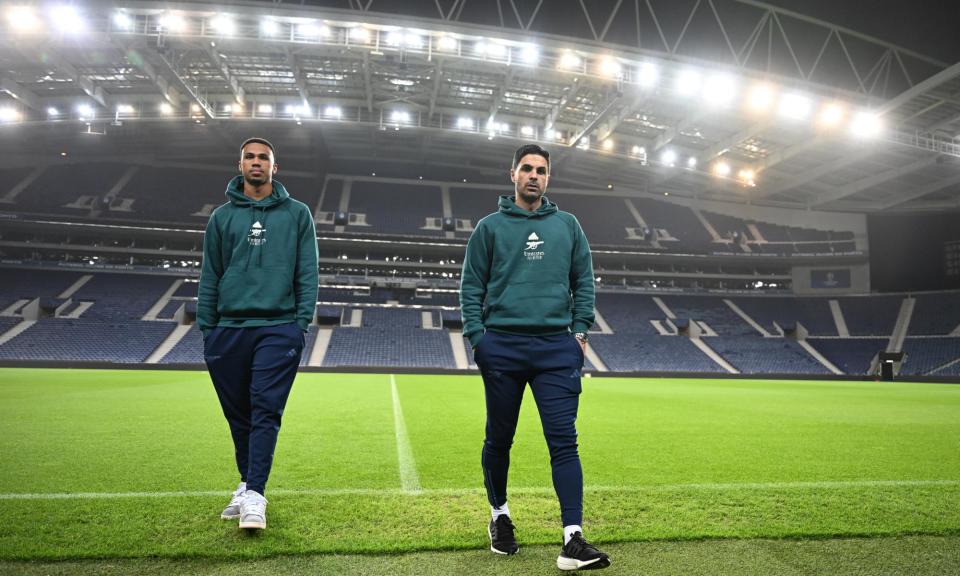Arsenal face Porto looking to break last-16 curse of their predecessors

Arsenal know, in trading London’s grey skies for the pastel blue of northern Portugal, that they face a challenge coloured in markedly different shades. It has been a long way back to the Champions League last 16 for a club that sat out of European competition two seasons ago so, on the one hand, a meeting with Porto calls for humility. Arsenal have not passed this point since 2010 and breaking that barren run would present another staging post in Mikel Arteta’s ride back towards the top.
From another perspective, it is an occasion that screams of opportunity. Estádio do Dragão is never a venue to take lightly and Arsenal have discovered that before, most recently losing 2-1 before Nicklas Bendtner’s hat-trick in the second leg helped them to that quarter-final spot 14 years ago. But reality shows that the draw could have handed them sterner tests than an embattled Porto who sit a barely acceptable seven points adrift of second place in the Primeira Liga. It is a chance to cast off historical baggage before surveying a field that, by the standards of this competition, looks abnormally weak.
Related: Gaël Clichy: ‘Pep Guardiola is all about the details. It was amazing to witness’
One step at a time. Arteta may not want his players to pore too heavily over the grisly record amassed by their predecessors in the 2010s, who fell at this hurdle in seven consecutive campaigns. The last of those outings in 2017 brought a 10-2 aggregate defeat by Bayern Munich: an excruciating 180-minute episode that encapsulated the looseness and, all too often, spinelessness of the late Arsène Wenger era. It was their third exit to Bayern in five seasons; Milan, Monaco and Barcelona, twice, also saw them off during that spell and each applied their own grievous blow to Arsenal’s sense of belonging among the elite.
The blunt truth was that Arsenal could not cope mentally or tactically back then. The dying moments of their first leg against Monaco in 2015 presented what came to be a defining sequence: brief promise when Alex Oxlade-Chamberlain halved a two-goal deficit in added time, followed by head-banging disbelief when Yannick Carrasco was immediately given the freedom of the Emirates to score what would prove the tie’s defining goal. Arsenal were naive, quixotic, unserious and Europe’s powers had moved on without them.
None of that applies now. For one thing, Arteta ensured no significant errors were made in Group B. They took Lens, Sevilla and PSV Eindhoven seriously because the alternative would have spelt trouble. Arteta has first-hand experience of what happens when the group stage is finished at half-pace. He was on the books as a player for five of those last- 16 exits and on just one of those occasions had Arsenal topped their group. They only managed it twice over those ill-starred seven years and felt the pain when giants swept them aside in the knockouts. Things might look different if Bayern, Borussia Dortmund or either of the Madrid sides had stood in Arsenal’s way this month.
How different in this case, though? Since mid-January, Arsenal have hit the kind of fearsome rhythm that never felt too far off when they were winning regularly in the autumn. They are scoring goals and barely giving up a shot; Arteta has taught them when to crank up the temperature and when to dial down, helped by the smothering influence of Declan Rice in midfield. Perhaps they lack a centre-forward who would send tremors across Europe’s more imposing citadels, and depth-of-squad issues may yet prevent a trophy hunt on two fronts, but any mention of their inexperience at this level masks the fact there are few better teams around.
A tormented Bayern should, on current form, inspire far less awe than last decade’s vintage. Paris Saint-Germain have their eyes on a post-Kylian Mbappé transition while, of the Spanish contenders, only Real Madrid have retained a vestige of their old aura. Perhaps Internazionale will emerge as a contender but the bookmakers may not be wrong in making Arsenal third-favourites. There is a sense of flux in many of the time-honoured superpowers, and genuine uncertainty as the Premier League cannibalises its competition. Of the remaining 16, only Manchester City look indisputably a notch or two above Arteta’s group.
Theorising carries little weight, though, when hostilities commence. “If they are the favourites then they need to show why they are favourites on the pitch,” said the Porto goalkeeper Diogo Costa, explaining his team have pinpointed weaknesses in Arsenal. The forwards Evanilson and Galeno, who have eight Champions League goals between them this season, are capable of exposing them.
A bump in the road cannot be discounted at a stadium that makes mincemeat of the unprepared; nor can an outcome after two legs that rivals the rude awakening offered by Sporting in last year’s Europa League. Caution will be a buzzword but Arsenal look ready, at long last, to recapture their place among the contenders.

